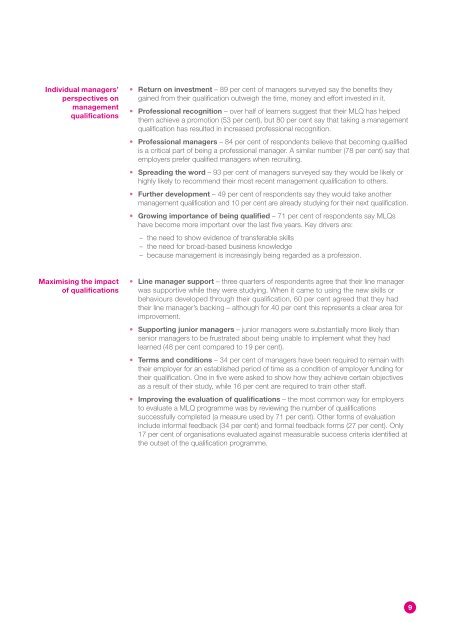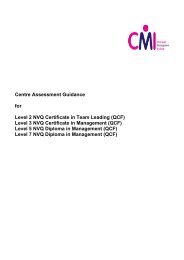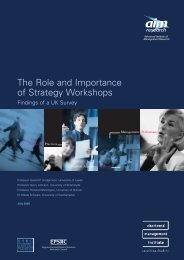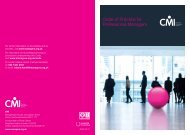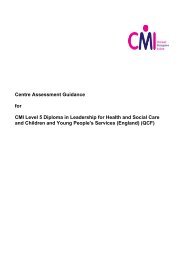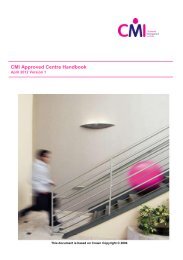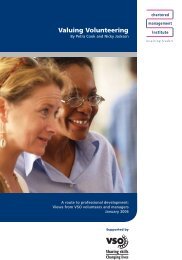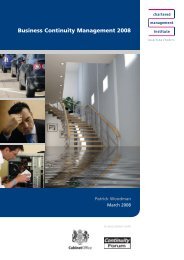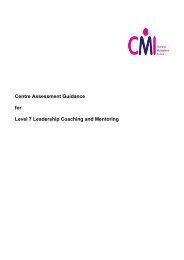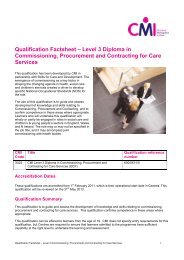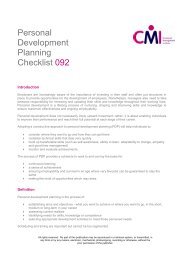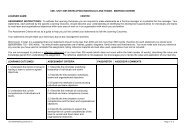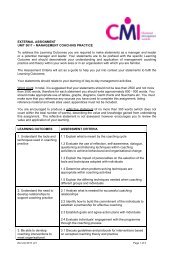The Value of Management and Leadership Qualifications
The Value of Management and Leadership Qualifications
The Value of Management and Leadership Qualifications
You also want an ePaper? Increase the reach of your titles
YUMPU automatically turns print PDFs into web optimized ePapers that Google loves.
Individual managers’perspectives onmanagementqualifications••Return on investment – 89 per cent <strong>of</strong> managers surveyed say the benefits theygained from their qualification outweigh the time, money <strong>and</strong> effort invested in it.••Pr<strong>of</strong>essional recognition – over half <strong>of</strong> learners suggest that their MLQ has helpedthem achieve a promotion (53 per cent), but 80 per cent say that taking a managementqualification has resulted in increased pr<strong>of</strong>essional recognition.••Pr<strong>of</strong>essional managers – 84 per cent <strong>of</strong> respondents believe that becoming qualifiedis a critical part <strong>of</strong> being a pr<strong>of</strong>essional manager. A similar number (78 per cent) say thatemployers prefer qualified managers when recruiting.••Spreading the word – 93 per cent <strong>of</strong> managers surveyed say they would be likely orhighly likely to recommend their most recent management qualification to others.••Further development – 49 per cent <strong>of</strong> respondents say they would take anothermanagement qualification <strong>and</strong> 10 per cent are already studying for their next qualification.••Growing importance <strong>of</strong> being qualified – 71 per cent <strong>of</strong> respondents say MLQshave become more important over the last five years. Key drivers are:– the need to show evidence <strong>of</strong> transferable skills– the need for broad-based business knowledge– because management is increasingly being regarded as a pr<strong>of</strong>ession.Maximising the impact<strong>of</strong> qualifications••Line manager support – three quarters <strong>of</strong> respondents agree that their line managerwas supportive while they were studying. When it came to using the new skills orbehaviours developed through their qualification, 60 per cent agreed that they hadtheir line manager’s backing – although for 40 per cent this represents a clear area forimprovement.••Supporting junior managers – junior managers were substantially more likely thansenior managers to be frustrated about being unable to implement what they hadlearned (48 per cent compared to 19 per cent).••Terms <strong>and</strong> conditions – 34 per cent <strong>of</strong> managers have been required to remain withtheir employer for an established period <strong>of</strong> time as a condition <strong>of</strong> employer funding fortheir qualification. One in five were asked to show how they achieve certain objectivesas a result <strong>of</strong> their study, while 16 per cent are required to train other staff.••Improving the evaluation <strong>of</strong> qualifications – the most common way for employersto evaluate a MLQ programme was by reviewing the number <strong>of</strong> qualificationssuccessfully completed (a measure used by 71 per cent). Other forms <strong>of</strong> evaluationinclude informal feedback (34 per cent) <strong>and</strong> formal feedback forms (27 per cent). Only17 per cent <strong>of</strong> organisations evaluated against measurable success criteria identified atthe outset <strong>of</strong> the qualification programme.9


